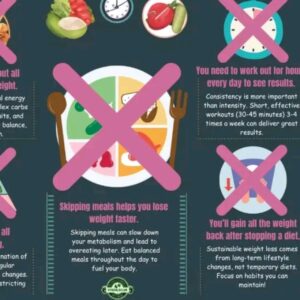Weight Loss Myths vs. Facts: A Sustainable Approach

Introduction
Weight loss is a topic surrounded by myths and misinformation, often leading people to adopt unsustainable or unhealthy practices. From fad diets to miracle supplements, many quick fixes promise results but fail to deliver lasting success. Understanding the facts about weight loss can help you achieve your goals in a healthy, sustainable way.
—
Main Points
1. Myth: Carbs Are the Enemy
Fact: Carbohydrates are a vital energy source. The key is choosing complex carbs like whole grains, fruits, and vegetables over refined options.
Low-carb diets may work short-term, but long-term success depends on balanced nutrition.
2. Myth: Skipping Meals Helps You Lose Weight
Fact: Skipping meals can slow your metabolism and lead to overeating later.
Instead, focus on portion control and eating regular, balanced meals to keep your energy stable.
3. Myth: You Can Spot-Reduce Fat
Fact: Targeting fat loss in specific areas isn’t possible. Fat loss happens throughout the body with a combination of calorie deficit, exercise, and time.
Strength training and cardio together are effective for overall fat loss and muscle tone.
4. Evidence-Based Tips for Sustainable Weight Loss
Prioritize Whole Foods: Focus on nutrient-dense foods like lean proteins, vegetables, fruits, and whole grains.
Stay Active: Combine strength training and aerobic exercises for optimal results.
Manage Stress: Chronic stress can lead to overeating or poor food choices. Practice mindfulness or relaxation techniques.
Get Enough Sleep: Poor sleep disrupts hunger-regulating hormones, making weight loss harder.
5. Avoid Quick Fixes
Diet pills, extreme calorie restrictions, or detox teas are not sustainable and can harm your health.
Instead, aim for gradual weight loss of 1–2 pounds per week, which is more likely to last.
—
Conclusion
Weight loss is not about quick fixes or following popular trends. It’s about making long-term lifestyle changes that prioritize your health and well-being. By debunking common myths and focusing on evidence-based practices, you can achieve sustainable results that benefit your overall quality of life. Remember, progress takes time, so be patient and consistent with your efforts.
Would you like tips on creating a personalized wei
ght loss plan or a visual guide on healthy meal options
Leave a Reply